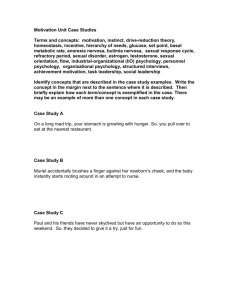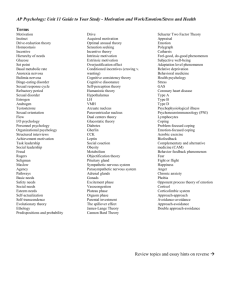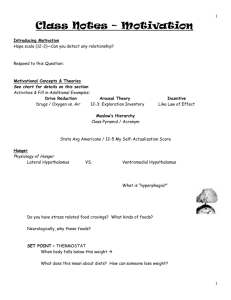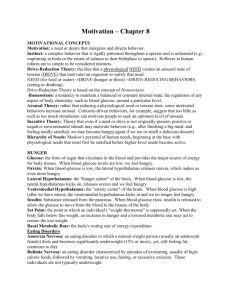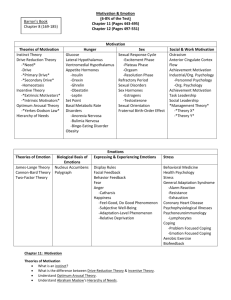AP Psychology Unit 8 – Motivation and Work – Guide to Your Study
advertisement
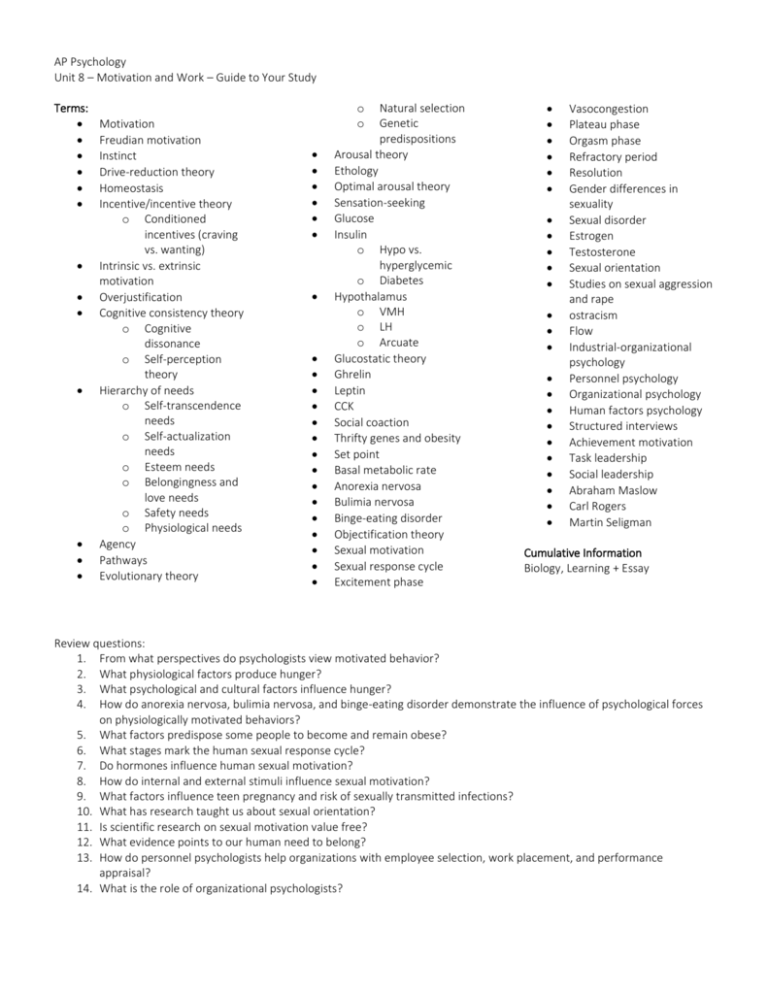
AP Psychology Unit 8 – Motivation and Work – Guide to Your Study Terms: Motivation Freudian motivation Instinct Drive-reduction theory Homeostasis Incentive/incentive theory o Conditioned incentives (craving vs. wanting) Intrinsic vs. extrinsic motivation Overjustification Cognitive consistency theory o Cognitive dissonance o Self-perception theory Hierarchy of needs o Self-transcendence needs o Self-actualization needs o Esteem needs o Belongingness and love needs o Safety needs o Physiological needs Agency Pathways Evolutionary theory o o Natural selection Genetic predispositions Arousal theory Ethology Optimal arousal theory Sensation-seeking Glucose Insulin o Hypo vs. hyperglycemic o Diabetes Hypothalamus o VMH o LH o Arcuate Glucostatic theory Ghrelin Leptin CCK Social coaction Thrifty genes and obesity Set point Basal metabolic rate Anorexia nervosa Bulimia nervosa Binge-eating disorder Objectification theory Sexual motivation Sexual response cycle Excitement phase Vasocongestion Plateau phase Orgasm phase Refractory period Resolution Gender differences in sexuality Sexual disorder Estrogen Testosterone Sexual orientation Studies on sexual aggression and rape ostracism Flow Industrial-organizational psychology Personnel psychology Organizational psychology Human factors psychology Structured interviews Achievement motivation Task leadership Social leadership Abraham Maslow Carl Rogers Martin Seligman Cumulative Information Biology, Learning + Essay Review questions: 1. From what perspectives do psychologists view motivated behavior? 2. What physiological factors produce hunger? 3. What psychological and cultural factors influence hunger? 4. How do anorexia nervosa, bulimia nervosa, and binge-eating disorder demonstrate the influence of psychological forces on physiologically motivated behaviors? 5. What factors predispose some people to become and remain obese? 6. What stages mark the human sexual response cycle? 7. Do hormones influence human sexual motivation? 8. How do internal and external stimuli influence sexual motivation? 9. What factors influence teen pregnancy and risk of sexually transmitted infections? 10. What has research taught us about sexual orientation? 11. Is scientific research on sexual motivation value free? 12. What evidence points to our human need to belong? 13. How do personnel psychologists help organizations with employee selection, work placement, and performance appraisal? 14. What is the role of organizational psychologists? Practice Questions 1. __________ is the idea that physiological needs create an aroused state that motivates an organism to reduce the need. a. Instinct theory b. Drive-reduction theory c. Self-assertion theory d. Arousal theory e. Hierarchy of needs 2. Attempts to control social behavior by using the punishing effects of isolation is an example of a. Attachment disorder b. Ostracism c. Exploitation d. Wanting to belong e. Conforming 3. 4. 5. ___________ explains why, when our biological needs are satisfied, we may still feel driven to experience stimulation a. Incentive b. Homeostasis c. Instinct d. Arousal theory e. Physiology Why does weight loss come slowly following a rapid loss during the initial three weeks of a rigorous diet? a. The number of fat cells makes further weight loss impossible b. When a person’s hunger increases, metabolism increases c. When an obese person’s set point has been reached, weight loss increases dramatically d. The body reacts as if it’s being starved and metabolic rates drop e. An obese person cannot maintain a rigorous weight loss diet In Eric Stice’s study of adolescent girls, vulnerable girls were more likely to exhibit which of the following tendencies? a. Increased body dissatisfaction b. Less self-consciousness c. Increased acceptance of their own body image d. Reduction in eating disorders e. Decrease in academic performance 6. Which of the following is the best biological explanation for why the human body stores fat? a. Fat signals affluence and social status b. Fat is a fuel reserve during periods when food is scarce c. Fat is a display of abundant food sources d. Fat keeps the body warm in winter climates e. Fat combats the global epidemic of diabetes 7. What do we call a need or desire that energizes and directs behavior? a. Incentive b. Refractory period c. Emotion d. Motivation e. Instinct 8. Abraham Maslow’s hierarchy of needs is a framework that a. Aims to eliminate arousal b. Explains our homeostatic system c. Helps to describe human motivation d. Helps people read self-transcendence e. Is universally fixed 9. Which of the following will likely increase an adolescent’s odds of pregnancy or contracting a sexually transmitted disease? a. High intelligence b. Father presence c. Religious engagement d. Sexual orientation e. Ignorance 10. Current research suggests that sexual orientation is most likely the result of a. Biology b. Intelligence c. Social problems d. Mental health e. Culture 11. What is the tendency to maintain a balanced or constant internal state? a. Hierarchy of needs b. Basal metabolic rate c. Homeostasis d. Instinct e. Motivation 12. A person who eats excessively and never seems to feel full may have which of the following conditions? a. Tumor in the hypothalamus b. Too much insulin c. Stomach ulcer d. Stomach bypass surgery e. Too much obestatin 13. Which of the following is one of the stages of the human sexual cycle? a. Plateau b. Vasocongestion c. Attraction d. Compensation e. Bingeing 14. Which of the following would fall within the realm of human factors psychology? a. Developing hiring procedures that enable businesses to hire the right person for the a job b. Applying successful motivational techniques in the workplace c. Focusing on workers’ rights to a safe work environment d. Researching the fairest way for management and labor to negotiate contracts e. Designing controls for a machine that allow people to operate it efficiently and safely 15. A fast-growing profession that applies psychology’s principles to the workplace is called a. Industrial-organizational psychology b. Gallup psychology c. A psychological contract d. Attention user interface e. Harnessing strengths 16. Managers who excel at social leadership a. Organize work tasks efficiently b. Keep work groups on task c. Set appropriate goals d. Produce high morale in their workers e. Are directive in their interactions with their workers 17. Mihaly Csikszentmihalyi has observed that between the anxiety of being overwhelmed and stressed, and the apathy of being underwhelmed and bored, lies a zone in which people experience a. A calling b. External rewards c. Flow d. Dissatisfaction e. distraction
